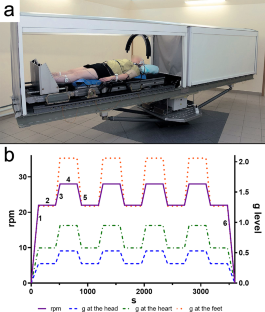Short-radius centrifugation (SRC) is a promising and economically feasible countermeasure in space flight and applies to gravity therapy in terrestrial medicine. The potential occurrence of undesirable orthostatic and vestibular reactions limits the use of this method. One way to minimize these risks is the ability of a human to adapt to the effects of overload. It is known that artificial gravity training may improve orthostatic tolerance. New data demonstrated that cardio-postural interactions and muscle-pump baroreflex activation are present during short-arm centrifugation. Based on previous studies, we hypothesized that repeated SRC in the interval training mode with angular velocities from 22 to 28 rpm may also improve postural tolerance. Six healthy male volunteers were observed before and immediately after five consecutive SRC sessions. The rest between SRC was at least three days. The SRC mode was an interval and included five 300-second platforms with 1.27 g at the feet and four 300-second platforms with 2.06 g at the feet. We registered the main postural characteristics and ground reaction forces data when the participant kept the center of pressure at a given point in a standing position with biofeedback and without this. After the first SRC session, there was a significant posture decondition. The SRC training effect was already noticeable after the second SRC session and was stable until the end of the experiment. The results demonstrate the development of postural tolerance to artificial gravity exposure in this mode and expand the understanding of sensorimotor adaptation capabilities.




